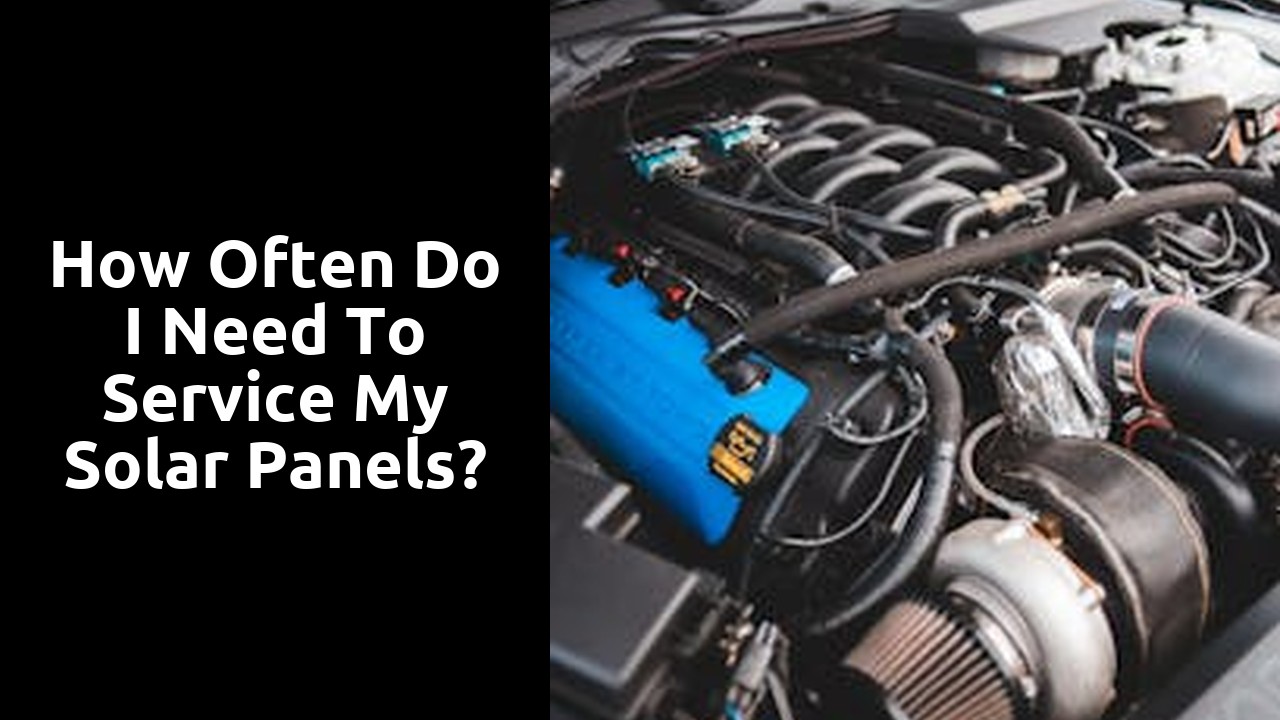How often do I need to service my solar panels?

Understanding Warranty Requirements for Solar Panel Maintenance
When considering the servicing of solar panels, it is crucial to understand the warranty requirements set by the manufacturer. These conditions outline the specific maintenance tasks that need to be carried out to keep the solar panels in optimal condition. Neglecting to adhere to these guidelines could potentially void the warranty, leaving you financially responsible for any repairs or replacements required. Thus, it is essential to thoroughly review and comprehend the warranty terms related to solar panel maintenance.
Compliance with the manufacturer's maintenance terms is integral to ensuring the longevity and efficiency of your solar panel system. Regular upkeep and servicing in line with these requirements not only uphold the warranty but also contribute to the overall performance of the panels. By staying proactive and diligent in executing the prescribed maintenance tasks, you can enhance the functionality and durability of your solar panels. Engaging in timely and appropriate Solar Panel Maintenance helps in maximising the return on investment and minimising the risk of unexpected breakdowns or issues.
Complying with Manufacturer's Maintenance Terms
When it comes to Solar Panel Maintenance, adhering to the manufacturer's prescribed maintenance terms is crucial to ensure the efficiency and longevity of your solar panels. Manufacturer's maintenance requirements are typically outlined in the user manual or warranty documentation provided with the solar panels. These terms often include recommendations for regular cleaning, inspection, and servicing intervals to keep the panels operating at their optimal capacity. Following these guidelines diligently will not only uphold the warranty conditions but also help prevent potential issues that may arise from neglecting maintenance tasks, saving you time and money in the long run.
How Weather Conditions Influence Maintenance Frequency
Weather conditions play a crucial role in determining the frequency of solar panel maintenance. In regions where the panels are exposed to harsh elements like extreme heat or heavy rainfall, more frequent maintenance may be necessary to ensure optimal performance and longevity. High temperatures can accelerate the degradation of solar panels, leading to a quicker decline in efficiency. Similarly, excessive moisture from heavy rain can cause corrosion or water damage, highlighting the importance of regular maintenance checks to detect and address any issues promptly.
Conversely, areas with milder weather conditions may not require maintenance as frequently, but seasonal changes still play a significant role in the upkeep of solar panels. For instance, periods of heavy pollen or dust accumulation during certain times of the year can reduce the panels' efficiency, necessitating more frequent cleaning. By adapting maintenance schedules to suit the local weather patterns and seasonal changes, solar panel owners can ensure that their systems continue to operate optimally and reap the benefits of sustainable energy production for years to come.
Adapting Maintenance Schedules to Seasonal Changes
Adapting maintenance schedules to match seasonal changes is crucial for ensuring the optimal performance and longevity of your solar panel system. In Australia, where weather conditions can vary significantly throughout the year, it's essential to be proactive in adjusting your maintenance routines accordingly. During the hotter summer months, dust and debris accumulation can impact solar panel efficiency, requiring more frequent cleaning and inspection. Conversely, in winter, reduced sunlight exposure and potential storm damage may necessitate additional maintenance checks to detect and address any issues promptly. By aligning your maintenance practices with the seasonal climate patterns, you can safeguard the effectiveness of your solar panel system and ultimately maximise its lifespan.
With the arrival of each new season, it's advisable to revisit your maintenance schedule and make any necessary adjustments to cater to the specific challenges presented by the changing weather conditions. Regular inspections during transitional periods, such as autumn and spring, can help identify potential issues early on and prevent them from escalating into more significant problems. Additionally, monitoring the system's performance throughout the year and keeping detailed records of maintenance activities can aid in tracking any patterns or recurring issues that may require special attention. By staying proactive and adaptable in your approach to solar panel maintenance, you can ensure that your system continues to operate efficiently and generate maximum energy output despite the seasonal fluctuations in environmental conditions.
Preventive Measures to Extend the Lifespan of Solar Panels
To ensure the longevity and efficiency of solar panel systems, regular maintenance is essential. Implementing preventive measures can significantly extend the lifespan of your solar panels and maximize their performance. By conducting routine Solar Panel Maintenance, you can proactively address any issues before they escalate, saving you both time and money in the long run.
One crucial preventive measure is to keep the solar panels clean. Accumulated dirt, dust, or debris can obstruct sunlight absorption and reduce the system's overall output. Regularly cleaning the panels, especially after periods of heavy rain or strong winds, is vital to maintain optimal performance. Additionally, inspecting the panels for any signs of physical damage or wear and tear is recommended to address potential issues promptly and prevent further damage.
Implementing Protective Measures Against Environmental Factors
To ensure the longevity and optimal performance of your solar panels, implementing protective measures against environmental factors is crucial. When it comes to solar panel maintenance, safeguarding them from harsh elements such as extreme weather conditions, dust, debris, and potential impact damage is essential. Installing a durable and secure mounting system can help protect the panels from strong winds and hail, while regular cleaning to remove dirt and grime buildup can prevent shading and maintain efficiency.
Additionally, considering the geographic location of your solar panels is vital in determining the specific environmental threats they may face. For instance, panels in coastal areas are more susceptible to corrosion from saltwater exposure, necessitating proper sealing and coating to prevent damage. Likewise, panels in regions prone to dust and debris accumulation might require more frequent cleaning to avoid reduced performance. By proactively addressing these environmental factors, you can effectively enhance the longevity and efficiency of your solar panel system.